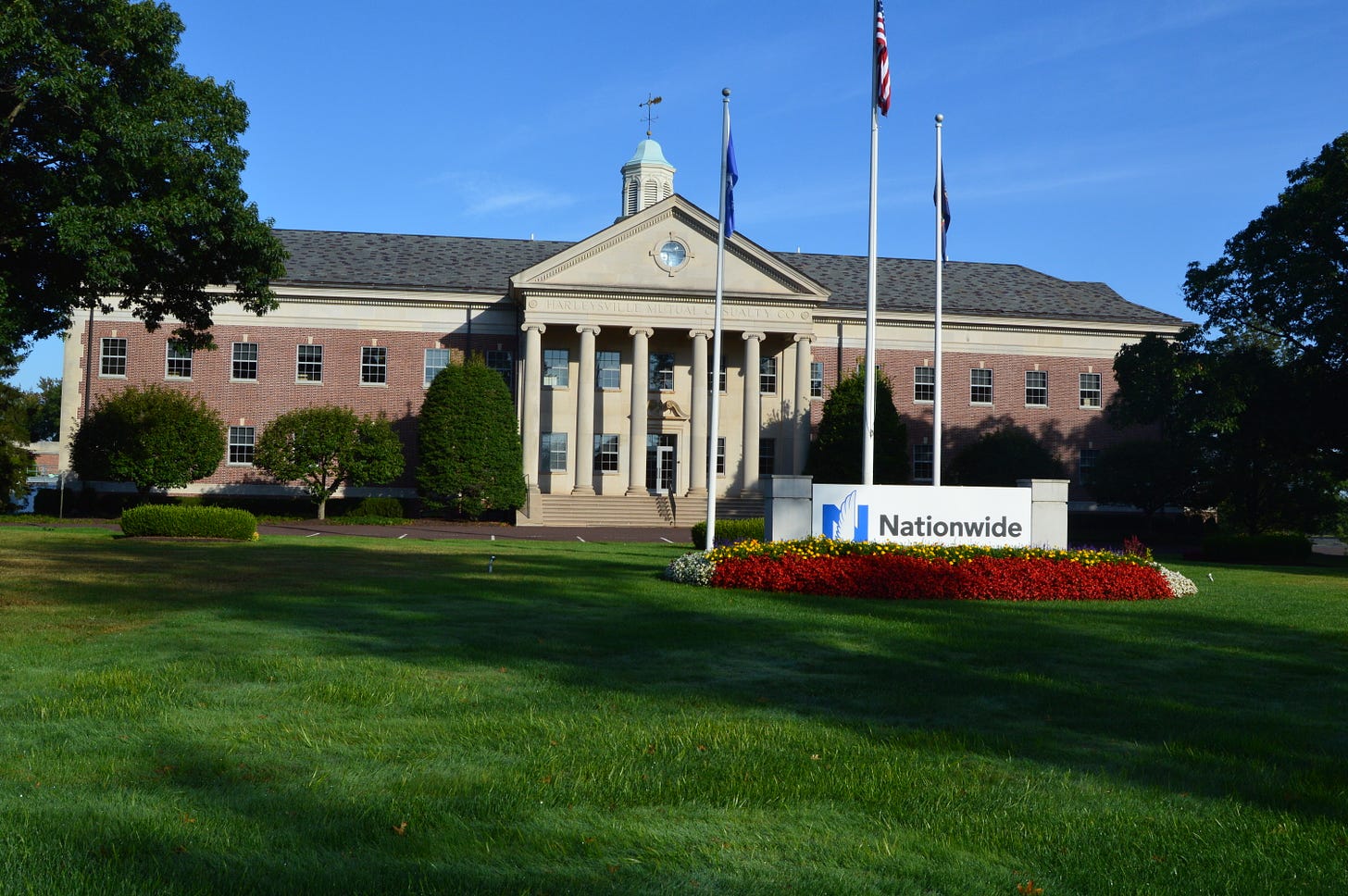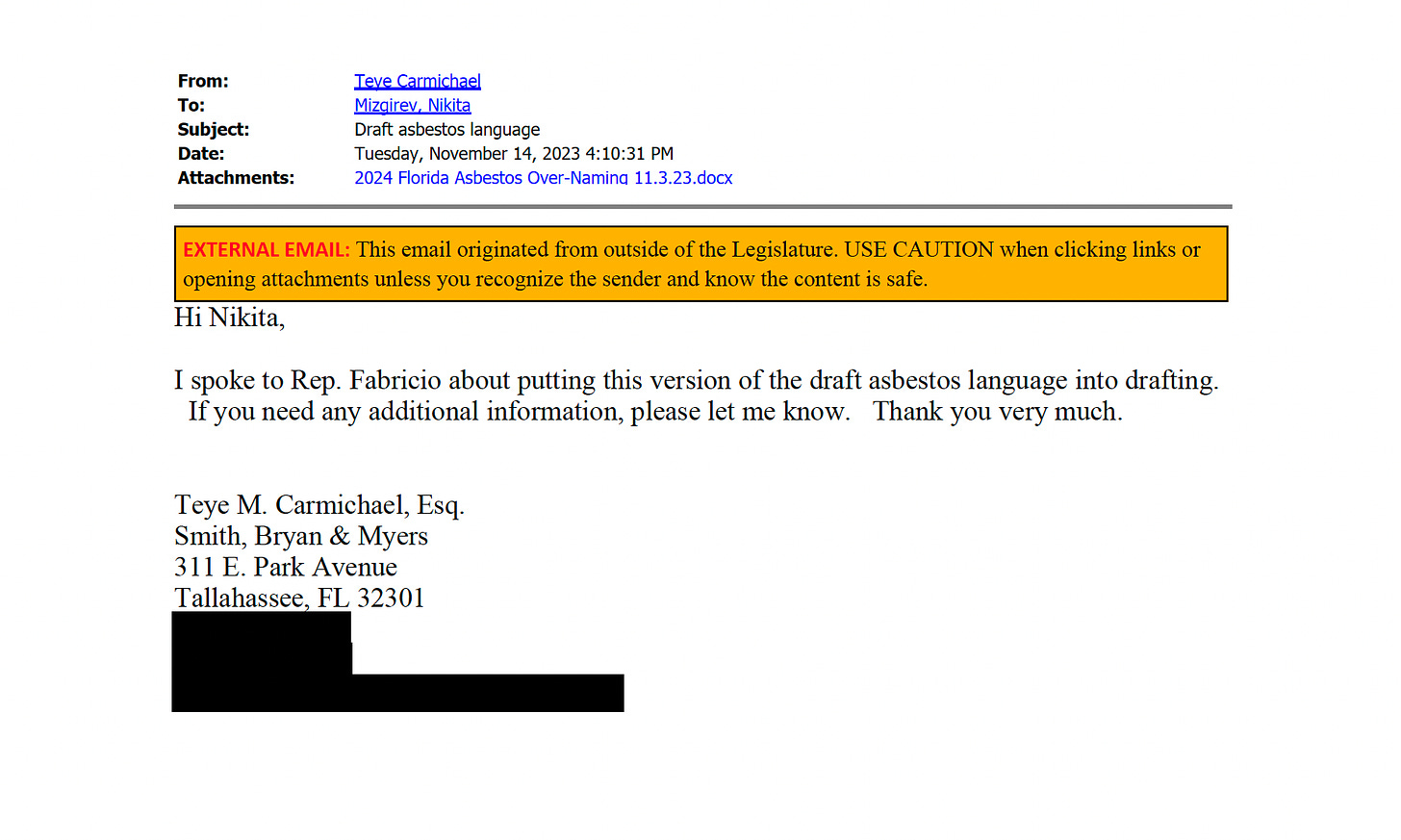A national insurance company wrote a bill to obstruct asbestos lawsuits in Florida
Records show lobbyists for Nationwide were behind a bill to help defendants defeat legal claims brought by cancer victims poisoned by exposure to asbestos.

This is Seeking Rents, a newsletter and podcast devoted to producing original journalism — and lifting up the journalism of others — that examines the many ways that businesses influence public policy across Florida, written by Jason Garcia. Seeking Rents is free to all. But please consider a voluntary paid subscription, if you can afford one, to help support our work.
In early February, when a subcommittee in the Florida House of Representatives took up an arcane bill dealing with asbestos litigation, a brigade of businesses groups showed up to support it.
A lobbyist for the Florida Chamber of Commerce urged lawmakers to pass the bill. So did someone from Associated Industries of Florida. Representatives from the Florida Insurance Council, the Florida Justice Reform Institute, and the United States Chamber of Commerce all endorsed it, too.
It was a powerful display of public support. And it suggested that numerous companies were behind the legislation, which would have made it easier for corporate defendants to defeat lawsuits brought by people who contract lung cancer from exposure to asbestos — an easily inhaled fiber that was once widely used in construction and manufacturing.
But records show the bill was sent in to the state House by one company in particular: Nationwide, the giant insurance company best known for its earworm advertising jingle. Nationwide turned a $1.3 billion operating profit last year — but the insurer has also had to cover deep losses from asbestos-related claims in recent years and remains exposed to further claims in the future.

Nationwide’s legislation was filed as Senate Bill 720 and House Bill 1367. The bills would have required anyone filing a lawsuit alleging illness or death from asbestos exposure to immediately obtain and reveal a bunch of information — including the specific asbestos products they were exposed, the names and contact information of every single person who knows about their exposure, and their personal smoking history. And the bills would have forced judges to dismiss cases in which plaintiffs failed to provide all those details.
Though no one from Nationwide ever publicly testified in favor of the legislation, the company said in a written statement to Seeking Rents that the proposal was meant to reduce the number of “unsupported” asbestos claims.
“Many asbestos claims are voluntarily dismissed by plaintiffs because the claims are not properly vetted before they are filed,” the company said. “If enacted, erroneously named defendants would be able to obtain earlier dismissal while claims against potentially responsible defendants would proceed to resolution more quickly and efficiently. While this streamlines the process, it does not deny justice to claimants with legitimate claims.”
Opponents included personal-injury attorneys and advocates for U.S. military veterans — who have historically faced high risks of asbestos exposure and mesothelioma, the aggressive form of lung cancer that asbestos can cause. They called the bill a fishing expedition that defendants would use to try and block future cases.
“In 2004, 2005, I served at Keesler Air Force Base for six to eight months. And during that time, there was asbestos in the building,” Ed Hood, an adjutant at the American Legion Post 13 in Tallahassee, told the House Civil Justice Subcommittee in February. “If I get mesothelioma later on in life, I won’t know what type of asbestos product was used in that building. And I certainly do not have the contact information for the hundreds of airmen I served with there.”
The impact could have been profound. Staffers in the state House warned that Nationwide’s bill would likely make it “more difficult for an injured party to bring a claim” against a company responsible for exposing them to cancer-causing asbestos.
“The bill requires the claimant to provide extensive and detailed information when initiating the lawsuit, which may serve as a bar to litigation for some claimants,” they wrote in an analysis of the bill.
The legislation ultimately failed to pass this session. Nationwide declined to say whether it would pursue the idea again next year.
But the episode offers an example of one of the key roles that business front groups like the Chamber of Commerce, Associated Industries, and the Insurance Council play in Tallahassee.
Nationwide spends a lot of money trying to make consumers like and trust the company — including sponsoring the National Football League and hiring Hall of Fame quarterback Peyton Manning as a corporate pitchman. And the company probably doesn’t want those same consumers knowing that it is lobbying for laws that could hurt vets dying from lung cancer.
So Nationwide — and other consumer-sensitive corporations like it — instead have brand-masking organizations like the Chamber, AIF and the Insurance Council do the public lobbying for unpopular legislation so they don’t have to get their own hands dirty.
The Florida bill also appears to be part of a larger national strategy.
For instance, when the Nationwide lobbyist sent the proposed legislation to the Florida House of Representatives, they referred to the measure as the “Asbestos Over-Naming” bill. That’s because it’s designed to prevent personal-injury attorneys from naming large numbers of defendants in an asbestos suit.
At least six other states have passed what boosters in those states also called asbestos over-naming bills — including Iowa in 2020; North Dakota, Tennessee and West Virginia in 2021; Arizona in 2022; and Utah in 2023.
These bills appear to have begun multiplying in state Capitols around the country right around the time that the American Legislative Exchange Council — the corporate-funded “bill mill” that produces model legislation for state legislatures to copy and tailor — published an “Asbestos Litigation Over-Naming Reform Act.” That’s according to the Center for Media and Democracy, a watchdog group that tracks ALEC.
And it turns out that Nationwide doesn’t just sponsor the NFL.
The insurance company has sponsored ALEC, too.





Ghostbusters isn’t coming to our rescue. We are going to have to make change happen in our communities.
If you know anyone willing to run for office, please send a nomination to the Dems today.
Businesses and the chamber of commerce need to stay out of lawmaking!